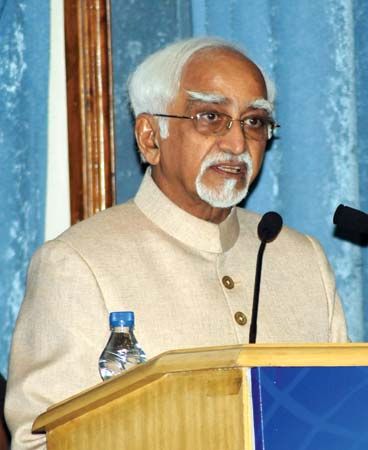Mohammad Hamid Ansari: A Legacy of Diplomacy, Leadership, and Service
Mohammad Hamid Ansari, the 12th Vice President of India, is one of the most distinguished public servants in Indian history. Throughout his career, Ansari demonstrated an unwavering commitment to public service, diplomacy, and national progress. His leadership, especially in his role as Vice President from 2007 to 2017, continues to inspire individuals in India and beyond.
In this article, we explore the life, career, and legacy of Mohammad Hamid Ansari. From his formative years to his significant contributions as Vice President, Ansari’s journey is a testament to perseverance, wisdom, and service to the nation.
Early Life and Education
Mohammad Hamid Ansari was born on 1st April 1937 in a distinguished family. His father, Dr. Ghulam Hasan Ansari, was a renowned freedom fighter and educator, while his mother, Begum Akhtar, was a social worker. Growing up in a family deeply rooted in the values of social justice and national service, Ansari was inspired from a young age to serve his country.
Ansari completed his early education in various schools in India and later attended Aligarh Muslim University, where he earned a degree in Political Science. He then pursued further studies at the School of International and Public Affairs at Columbia University in the United States, where he specialized in diplomacy and international relations.
Career and Diplomacy
Ansari’s career in public service began when he joined the Indian Foreign Service (IFS) in 1961. Over the course of his career, he served in various diplomatic positions across the globe, representing India with distinction. His tenure as a diplomat provided him with invaluable experience in international relations, and he quickly became known for his astute political acumen, eloquence, and ability to navigate complex global issues.
One of his most notable postings was as India’s Ambassador to the United Arab Emirates (UAE) in the late 1980s. During his time in the UAE, Ansari worked to strengthen India-UAE relations, fostering economic and cultural exchanges between the two nations.
Ansari’s diplomatic skills were further tested when he was appointed as India’s Permanent Representative to the United Nations in 1993. His tenure at the UN was marked by his efforts to advocate for India’s interests on the global stage. He played a key role in strengthening India’s position on various international forums, highlighting his diplomatic prowess and commitment to India’s foreign policy objectives.
Vice Presidency of India
In 2007, Mohammad Hamid Ansari was elected as the Vice President of India, a position he held for two consecutive terms until 2017. As Vice President, he also served as the Chairman of the Rajya Sabha, the upper house of the Indian Parliament. Ansari’s tenure as Vice President was characterized by his calm demeanor, extensive knowledge, and fairness in presiding over debates in the Rajya Sabha.
During his time in office, Ansari was widely regarded for maintaining the decorum and dignity of the Rajya Sabha. He was known for his impartiality and ability to facilitate meaningful discussions, even on contentious issues. His leadership was marked by a focus on strengthening democratic processes, ensuring that the voices of all members were heard, and maintaining order during debates.
One of the most significant aspects of Ansari’s vice presidency was his deep commitment to upholding the values enshrined in India’s Constitution. He frequently emphasized the importance of democracy, secularism, and tolerance in his speeches, urging fellow citizens to embrace these values in their daily lives.
Legacy and Contributions
Mohammad Hamid Ansari’s legacy extends far beyond his role as Vice President. His contributions to diplomacy, governance, and nation-building have been widely recognized. Ansari was instrumental in shaping India’s foreign policy, especially in the context of strengthening ties with the Middle East, Africa, and the United States.
His tenure as Vice President was also marked by a focus on issues of national importance, including education, social justice, and minority rights. Ansari strongly advocated for the inclusion of marginalized communities in the political and social processes of India, believing that true democracy can only be achieved when everyone has a voice.
Ansari was also a passionate proponent of the right to information and transparency in governance. He often spoke about the need for greater accountability in government institutions and the importance of an informed citizenry. His speeches and writings reflect his deep understanding of India’s democratic system and his belief in its ability to overcome challenges.
Daily Life and Observance
Despite his prominent role in Indian politics and diplomacy, Mohammad Hamid Ansari led a life of simplicity and discipline. Known for his humility, Ansari was a figure of grace and wisdom, always focused on the service of the nation. Even during his tenure as Vice President, Ansari remained deeply engaged in intellectual discussions and continued to write extensively on matters related to diplomacy, national security, and governance.
Ansari’s observance of Islamic traditions and his commitment to secularism was a defining feature of his personality. He demonstrated through his life and actions the balance between personal faith and public responsibility. His values of tolerance, respect for diversity, and commitment to national unity were reflected in his everyday life.
Significance of Mohammad Hamid Ansari
- A Diplomat with Vision: Ansari’s diplomatic career elevated India’s standing on the world stage. His ability to navigate complex international relations with skill and finesse was instrumental in strengthening India’s global position.
- A Defender of Democracy: As Vice President, Ansari was a staunch advocate of democratic values. His role as Chairman of the Rajya Sabha helped preserve the sanctity of India’s democratic institutions.
- A Champion of Secularism: Ansari strongly believed in the secular fabric of India and frequently spoke out against any efforts to undermine this core principle. His speeches reflected his commitment to preserving India’s pluralistic identity.
FAQs about Mohammad Hamid Ansari
Q1: What is Mohammad Hamid Ansari’s legacy?
Ansari’s legacy lies in his contributions to Indian diplomacy, his tenure as Vice President, and his advocacy for democratic values, secularism, and social justice.
Q2: How did Mohammad Hamid Ansari contribute to India’s foreign policy?
Ansari played a key role in strengthening India’s international relations, particularly with countries in the Middle East, Africa, and the United States. His experience as a diplomat helped shape India’s foreign policy priorities during his tenure.
Q3: What role did Mohammad Hamid Ansari play in the Rajya Sabha?
As Chairman of the Rajya Sabha, Ansari was known for his impartiality, calm demeanor, and ability to ensure that debates were conducted in a respectful and orderly manner.
Conclusion
Mohammad Hamid Ansari’s journey from a diplomat to the Vice President of India is a story of dedication, intellect, and service to the nation. His leadership in Indian politics, especially his tenure as Chairman of the Rajya Sabha, has left an indelible mark on the country’s democratic processes. With a focus on diplomacy, secularism, and social justice, Ansari’s life serves as an inspiring example of a public servant committed to making India a better, more inclusive nation for all its citizens.










